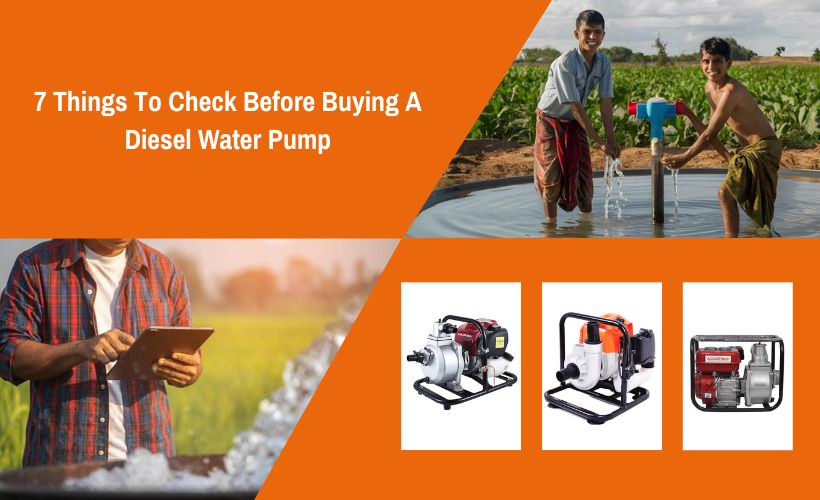Whether you’re irrigating a farm, managing a construction site, or preparing for emergency flood control, having a reliable water pump is essential. And while electric pumps are widely used, a diesel water pump stands out for its power and portability, especially in areas where electricity is limited or unavailable.
But not all pumps are created equal. Choosing the wrong one can lead to headaches, wasted money, and poor performance. To help you make the right choice.
1. Understand Your Needs First
Before diving into product specs, take a step back and think about your exact requirements:
- Water source: Are you drawing from a well, pond, river, or tank? This affects the suction lift needed.
- Total head: What’s the vertical distance the water must travel, including any pipe friction losses?
- Flow rate: How much water do you need to move—liters per minute or hour?
- Application: Is it for agriculture, construction, domestic use, or something else? A diesel water pump for agriculture may need specific pressure and discharge capabilities compared to one used for industrial tasks.
- Usage frequency: Will the pump run daily or just occasionally? This affects the importance of fuel efficiency and durability.
Knowing your exact requirements helps you avoid overpaying for unnecessary power—or worse, buying an underpowered pump.
2. Check the Pump’s Performance Specs
Once you know what you need, start comparing the specs:
- Maximum head: Should be higher than your total calculated head.
- Flow rate: Must meet your irrigation or dewatering needs.
- Suction lift: Important if you’re drawing from deep or low water sources.
- Engine horsepower: More power usually means better performance.
- Fuel efficiency: Running costs matter, especially for frequent use.
Pro tip: Don’t just rely on “maximum” figures—look at the performance curve to understand how the diesel water pump performs under real-world conditions.
3. Look at Engine Quality and Brand Reliability
The engine is the heart of your water pump. A strong, well-made engine means fewer breakdowns and lower maintenance costs.
- Reputable brands: Choose engines from trusted manufacturers with good support networks.
- Air-cooled vs. water-cooled: Water-cooled engines are better for continuous use but can be more complex.
- Starting system: Recoil, electric, or both? Electric start is convenient but depends on battery reliability.
- Build quality: Solid construction and high-quality materials suggest better long-term reliability.
4. Examine the Pump Construction and Materials
Durability matters—especially when dealing with tough water sources on a farm or at a work site.
- Casing material: Cast iron, aluminum, or stainless steel. Stainless steel is most resistant to corrosion.
- Impeller type: Needs to match your water conditions. Sand or debris in the water? Go for abrasion-resistant options.
- Seals: Good mechanical seals reduce leakage and boost longevity.
When choosing a farm water pump, always consider how well its construction handles the elements and different water types.
5. Think About Portability and Ease of Use
If you’re moving the pump around the farm or job site, portability is key.
- Weight and dimensions: Lighter, compact pumps are easier to transport.
- Frame and handles: Make sure it has a solid frame and easy-to-grip handles.
- Wheels: Some models come with a wheel kit for added mobility.
Also, check how easy it is to operate and maintain:
- User-friendly controls: A simple, clear panel saves time and effort.
- Maintenance access: Are parts easy to reach for routine servicing?
6. Check the Warranty and Support
A solid warranty and good after-sales service can save you a lot of stress down the road.
- Warranty length: Longer is usually better, but read the fine print.
- What’s covered: Understand what’s included and what’s not.
- Parts and service availability: Are spare parts easy to get? Is there a nearby service center?
Whether you’re buying a diesel water pump for agriculture or a general-purpose unit, after-sales support matters.
7. Compare Prices and Read Reviews
Finally, don’t forget to shop around and do some research:
- Compare multiple brands and sellers: Look for a good balance of price, quality, and features.
- Read real user reviews: See how the pump performs in actual use cases.
- Avoid the cheapest option: It might cost less upfront, but more in the long run.
A good water pump for agriculture should offer long-term value, not just a lower price tag.
Conclusion
A water pump is a serious investment, especially if you’re using it for critical tasks like irrigation. By checking these seven essential factors, you can find a farm water pump that meets your needs, performs reliably, and gives you great value over time.
Looking for a dependable diesel water pump for agriculture? Make sure you do your homework—and invest in quality that delivers, season after season.
FAQ
Q1. What are the 7 major parts of a water pump?
The 7 major parts of a water pump in pump systems are the impeller, shaft, housing, seals, couplings, suction and discharge nozzles, and the check valve. The impeller serves as the heart of the pump, driving the water through the system.
Q2. How do I choose a pump in the industry?
- Type of Fluid: The type of fluid you’re pumping affects the type of pump you choose. …
- Flow Rate: The flow rate is a critical factor in pump selection. …
- Pressure Requirements: The pump must be able to generate the necessary pressure for the fluid to flow at the required rate.




